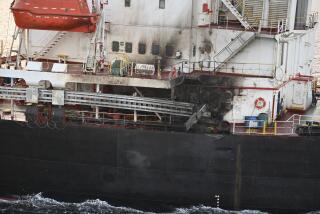NATO Agrees to Blockade of Yugoslavia : Balkans: But the 16 member nations put off a decision on a specific commitment of naval forces until at least Friday.
BRUSSELS â The NATO allies agreed in principle Wednesday to help enforce the U.N.-authorized naval blockade of Yugoslavia but put off a decision on a specific commitment of forces for at least two days.
NATOâs governing council--ambassadors to the North Atlantic Treaty Organization from the 16 member nations--will meet again Friday, after military planners have had time to draw up a proposal.
In a statement issued after its closed meeting, the NATO Council said it would âcoordinate and cooperateâ with the Western European Union, which consists of nine of NATOâs European members.
WEU planners will meet today and WEU ministers will meet Friday in Rome to consider their own contribution to enforcing a naval blockade.
An American spokesman said Wednesdayâs action by the NATO Council squared with U.S. policy toward the rump Yugoslavia.
The Bush Administration, like most NATO allies, has hesitated to get its forces involved in what it fears could become a Vietnam-like quagmire, although it pressed hard for the new Security Council resolution authorizing the use of force to support the embargo.
The United Nations in May ordered a trade embargo of Serbia and Montenegro, the two remaining Yugoslav republics, as punishment for supporting ethnic Serbs in the civil war in the former Yugoslav republic of Bosnia-Herzegovina.
The embargo has been widely violated. But only on Monday did the Security Council authorize the use of force to prevent violations. NATO members have 10 destroyers and frigates, including one U.S. vessel, the guided-missile frigate Halyburton, on station in the Adriatic Sea off Montenegro.
U.S. Defense Department officials also said the amphibious assault ship Guam and the cruiser Wainwright were on temporary duty in the Adriatic, conducting surveillance and search-and-rescue operations for humanitarian relief flights into Bosnia-Herzegovina.
NATOâs role, to date, in the Yugoslav conflict has consisted only of monitoring compliance with the U.N. embargo of Serbia and its declaration of a no-fly zone over Bosnia.
Internal divisions have blocked it from committing ground forces to protect relief convoys into Bosnia.
Naval action in the Adriatic Sea will not strike at the source of the most widespread violations of the trade embargo against Serbia and Montenegro. Most goods reaching the rump Yugoslavia have arrived overland or particularly via the Danube River from neighboring Romania and Bulgaria.
Romaniaâs deputy transport minister, Calin Marinescu, said Wednesday that Romania, acting under the new U.N. resolution, was âstopping all vessels loaded with cargo of doubtful origin and/or with doubtful destination for inspection.â
Without specifying the number of boats that had been searched, he said a Chinese craft and several from Russia and Ukraine were being checked. He said no force had been necessary.
Donald Russell, the U.S. team leader of an international group monitoring traffic on the Danube, said three or four ships flying the Yugoslav flag had also been stopped since Monday.
Bulgarian authorities have allowed tanker trucks to cross into Yugoslavia if their drivers carried documents saying the fuel was destined for other countries. But Mondayâs Security Council resolution bans shipments across Yugoslavia of crude oil, petroleum products, coal, energy-related equipment, metals, chemicals, rubber, tires, vehicles, aircraft and motors.
More to Read
Sign up for Essential California
The most important California stories and recommendations in your inbox every morning.
You may occasionally receive promotional content from the Los Angeles Times.










